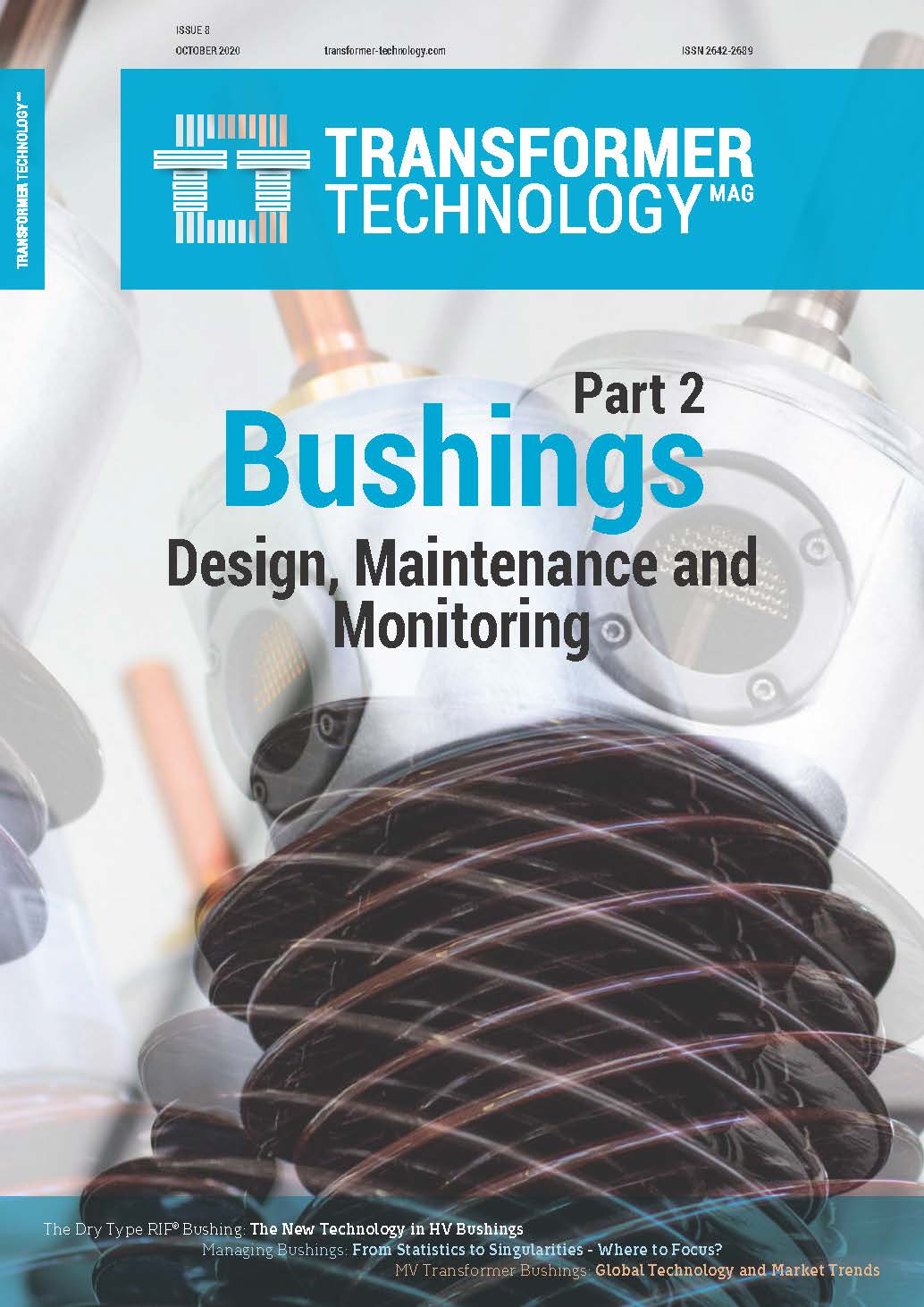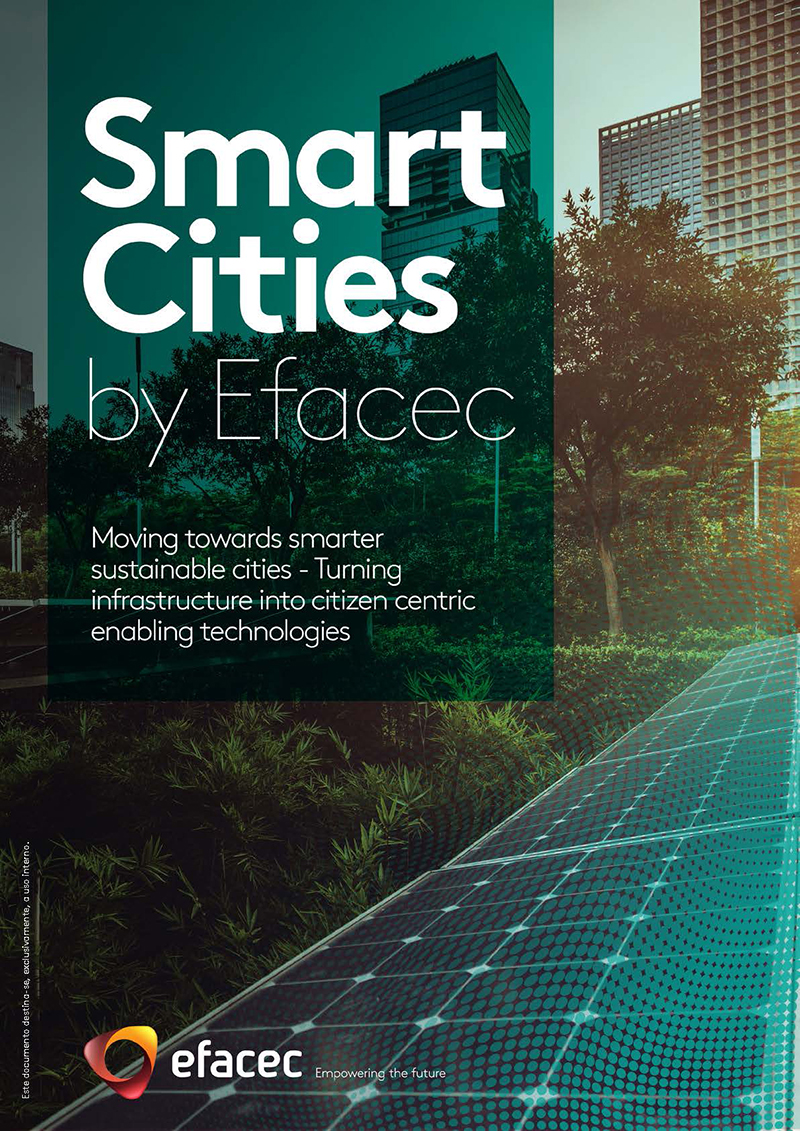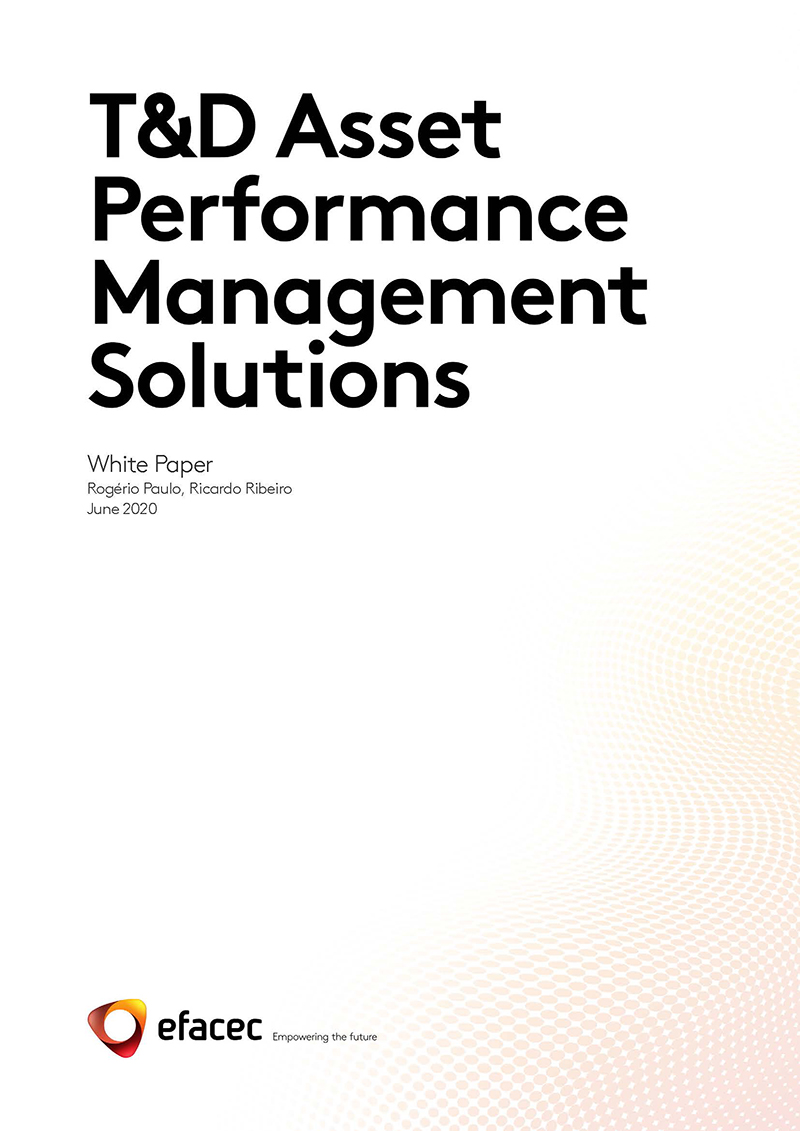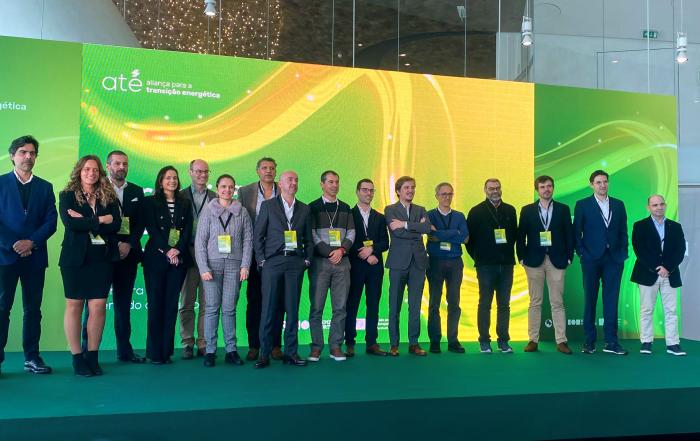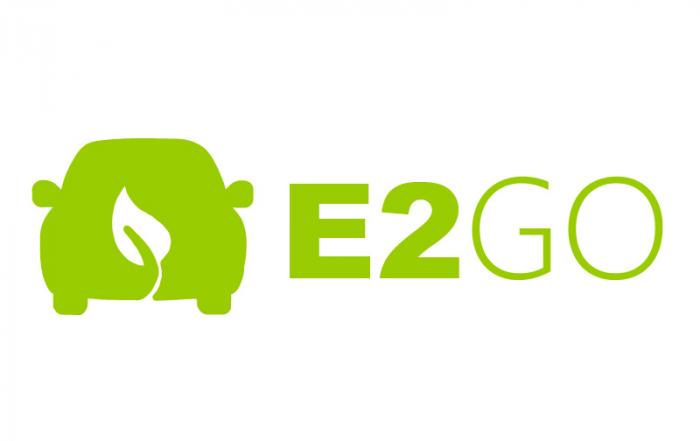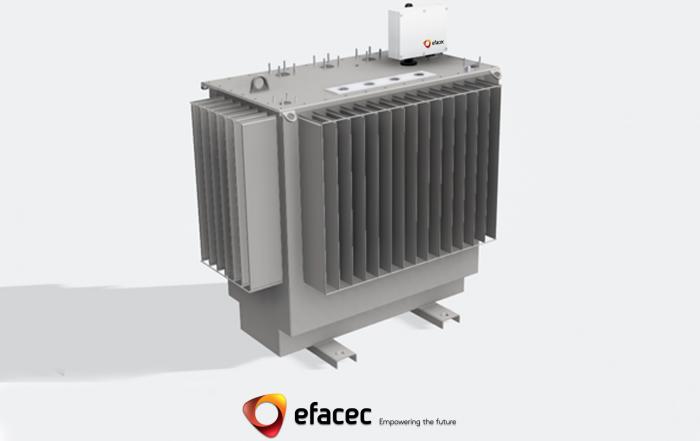Technology and Innovation
These factors are the fundamental basis of the continued development of new products by the company with own know-how and full autonomy.
Technology Management
Our technology office is linked with the Committee of Technology
and its Mission
supporting the definition and implementation
Strategy of Technology and Innovation Efacec
through the development of the following external and internal activities:
Definition and communication of technological positioning
Relationship promotion with stakeholders
and strategic partnerships in IDT+I
Technology Radar
Design of Efacec technological Roadmap
Creating conditions for development
of new technological opportunities
Promoting synergies as
the internal base skills
and cross technological knowledge
Promotion of new IDT+I projects
Intense technological monitoring
and implementation of projects
Facts | 2015
People allocated to R&D
More than 20 articles presented international
More than 50 active scientific and technologic partnerships
R&D project in course
PROJECTS CO-FUNDED BY EU

All Projects
HORSE – Holistic, Omnipresent, Resilient Services for Future 6G Wireless and Computing Ecosystems
Project Nº 101096342 (2023-2025) – HORIZON
The project HORSE focuses on a holistic research approach aimed to design, develop and validate an autonomous, self-evolving and end-to-end security solutions for future Command and Control Centres.
HORSE will demonstrate how applications can leverage the ongoing evolution of 6G capabilities, as well as deal with the technology solutions, and system evaluation not yet foreseen, towards an omnipresent, smart and secure network service provisioning in the future network-of-networks landscape. HORSE project will address the challenge towards 6G infrastructure operation for smart connectivity and service management, and beyond, showing its effectiveness at the intersection of 6G connectivity, computing infrastructure management and security.
Efacec aims to define requirements for future command centre platforms in terms of Secure Service Development and Smart Security, contribute in the specification of use case definition and validation to confirm 6G potential of application in public transportation systems, learning about the best practices in terms of architecture and orchestration of new end-to-end services for Command Centre platforms for Light-Rail Trams and Metros.
Visit the website – Homepage – HORSE project (horse-6g.eu)
PORTUGAL 2020
Project Nº 101069702 – SSTAR [2022 – 2025]
The on-going energy transition towards a decarbonized economy is changing profoundly the infrastructure of the power grids worldwide. Conventional high-power transformers are not fully prepared to overcome these challenges, as they do not have intrinsic capabilities regarding active system support. Instead, Solid-State Transformers (SSTs) have emerged in the last years as a disruptive technology able to extend the typical functionalities of a regular transformer, optimizing the power flows and introducing a high degree of digitalization and intelligence in the network. However, SSTs are not still a mature technology and only prototypes of up to 15 kV. Therefore, their use is currently restricted to low-voltage applications.
In this context, SSTAR aims to increase the operation voltage level of SSTs to enlarge their applications within the energy power sector while improving its performance in a reliable, cost-optimized and sustainable way. To do so, three main R&I Lines will be developed. The combined effect of these innovations will be validated at TRL 4 in two certified test-beds in Spain and Portugal. Hence, SSTAR seeks to pave the way for the development of new disruptive HV SST devices more attractive for commercial purposes than the prototypes made so far, and able to be used in distribution and transmissions grids.
HORIZON 2020
GREENH2SINES [2021 – 2026]
GREENH2SINES will help Europe to reach green and affordable electrolysis at GW-scale in 2030 by developing and demonstrating a first-of-a-kind 100 MW alkaline (ALK) electrolyser at TRL8, leveraging scale-up, standardization and manufacturing automation. This 100 MW electrolyser will be composed of innovative, scalable and fast-cycling 8 MW modules integrated into a flexible green hydrogen production process (FGHPP) which overcome bottlenecks related to CAPEX, efficiency, size, lifetime, current-density, and flexibility.
GREENH2SINES will supply multiple local off-takers and help reduce green H2 production cost. An innovative interface system composed of advanced power electronics will allow for the direct coupling of the electrolyser with local, dedicated hybrid (solar and wind) renewable energy. Moreover, an innovative, AI-enhanced Advanced Hydrogen Management System will allow for the optimization of OPEX, load factor, real-time H2 production management, system behaviour analysis, etc.
The consortium includes the full value chain including European electrolyser manufacturing, green hydrogen production, off-takers from the chemical industry and natural gas grids, power electronics developers, AI energy management system developers, renewable energy providers and electrical grid balancing.
Clear exploitation and replication plans based on rigorous analyses are presented to reach 1 GW by 2030 in Sines and beyond.
Efacec, within the scope of the participation, will bring to the project its long dated and solid experience, know-how and technological skills within the electrical energy domain, namely in digital control and energy converters power electronics solutions.
ERASMUS +
Project Nº 612675-EPP-1-2019-1-SE-EPPKA2-SSA-B – ALBATTS [2020 – 2023]
The Alliance for Batteries Technology, Training and Skills (ALBATTS) is a European funded project with the objective of contributing to the electrification of transport and green energy in Europe, by designing a blueprint for competences and training schemes of the future, in the battery and electromobility sector.
The goal will be accomplished by bringing together the demand and supply side of skills related to this sector. Including enterprises along the batteries for electromobility value chain, European workers disrupted or highly affected by the change brought about with transfer to electromobility, educational providers, decision makers and general public.
The ALBATTS projet joins 20 partners, from 10 European countries.
Efacec contributes to the complex process of researching what are the drivers of change and trends for the battery industry, as well as for job roles, skills and competences looked for by battery players in the whole battery value-chain. The research work is complemented with the workshops, where Efacec is the leader in organizing, by managing a team with more than 6 partners and of the project and all the resources available to create a meaningful experience.
The participation of Efacec in the consortium of the ALBATTS project endorsed the network in the battery industry and permitted the increase of knowledge in resources, technology, trends and drivers of change in the business of battery storage systems.
HORIZON 2020
Project Nº 957769 – TIGON [2020 – 2024]
The EU project TIGON will design a hybrid alternating and direct current microgrid system, one that is decentralised and close to valuable sources of renewable energy.
TIGON’s technical, digital and business solutions will be developed at two demo sites located in France with emphasis on photovoltaics and in Spain with a focus on batteries.
In addition, two use cases in the residential and urban railway sectors in Finland and Bulgaria will act as niche markets to increase replication potential.
Efacec will be in charge of manufacturing the STT to be deployed at CIEMAT and CEA demo-sites and will integrate the innovative DC/DC converters at CEA ensuring their compliance with grid codes. As a result, Efacec will be also in charge of developing CIEMAT converters and will define an exploitation and commercialization strategy together with CIRCE and CEA for the technologies developed within TIGON.
Portugal 2020
Project Nº 01-0247-FEDER-045926 – Transformer 4.0 : Digital Revolution of Power Transformers [2020 – 2023]
The Transformer 4.0 (TRF40) project seeks to introduce the digital transformation in power transformers, whose design and manufacturing are areas where Efacec holds a global leadership position. Aiming for this transformation, a comprehensive research plan focused on the Digital Twin (DTwin) concept will be implemented. This DTwin, as a virtual counterpart of the physical system, will enable disruptive approaches in the transformer design and manufacturing – with new communication models – and will offer new added value services – such as intelligent condition monitoring, preventive maintenance, aging evaluation under determined servicing conditions, among others. It will also follow the physical product during its whole life cycle through a DT enabled platform powered with optimization and artificial intelligence tools, will enable valuable insights about designing future systems, and will predict the system’s response to different types of disruptions in the grid. Furthermore, digital manufacturing will be explored through additive manufacturing, which has the potential to revolutionize the design and manufacturing of power transformers. This feature integrated with the Digital Twin platform will allow for a disruptive approach in the manufacturing and servicing of transformers.
Project Nº 045409 – GreenGear36 [2020 – 2022]
The GreenGear36 project, undertaken by Efacec Energia through its Switchgear (AMT), Automation (ASE) and Service (SRV) business units, has the objective of investigating and developing a new, smart GIS switchgear for primary distribution networks up to 36kV, with advanced sensor and monitoring capabilities for the smart, flexible power grids of the cities of the future, while also substituting the use of SF6 gas (current technology with a high environmental impact) with a greener, preferentially natural alternative that maintains high levels of functionality and safety in line with international standards. In parallel the project also aims to investigate and develop an innovative internal arc simulation methodology in collaboration with the INEGI institute, allowing shorter equipment development time and higher levels of equipment safety.
HORIZON 2020
Project Nº 824433 – INSULAE [2019 – 2023]
INSULAE fosters the deployment of innovative solutions for the EU islands decarbonization by developing and demonstrating at 3 Lighthouse Islands (located in Croatia, in Denmark and in Portugal) a set of interventions linked to 7 replicable Use Cases, whose results will validate an Investment Planning Tool that will be then demonstrated at the 3 Follower Islands (located in Spain, in Germany, and in Greece) for the development of the associated Action Plans. On top of this the project will reach out to other islands with interest in this topic, and facilitate mutual dissemination between all the islands.
INSULAE contributes to the Clean Energy for EU Islands Initiative by providing an Investment Planning Tool (IPT) able to create Actions Plans for the islands to generate their own sustainable, low-cost energy. The three Lighthouse Islands have been selected looking for their representativeness of the whole EU stock of islands. The innovative interventions implemented and tested throughout the project execution will impact the 3 lighthouse islands, fostering their decarbonization.
The project joins 27 partners, counting with five public authorities, six energy and water utilities, four technology providers, two energy software developers, six RTOs, one environment NGO, one business models expert, one engineering company and one entity for social aspects and replication.
Efacec will develop, supply and deploy the infrastructure needed in the lighthouse island of Madeira. The Automation business unit will customize and develop all the software layers needed for the smart EV Chargers and for the V2X capabilities. For the demonstration of the Battery Energy Storage system in Madeira, the Automation business unit will supply the Battery Inverter, integrate batteries and develop the Energy Storage Controller needed to demonstrate a Battery Energy Storage System, which is expected to be relevant in an isolated system with a strong integration of intermittent renewable sources.
Project Nº 856709 – 5GROWTH [2019 – 2021]
The objective of 5Growth is the technical and business validation of 5G technologies from the verticals’ points of view, following a field-trialbased approach on vertical sites (TRL 6-7). Its vision is to empower verticals industries, such as Industry 4.0, Transportation, and Energy with an AI-driven Automated and Sharable 5G End-to-End Solution that will allow these industries to simultaneously achieve their respective key performance targets.
Towards this vision, 5Growth will automate the process for supporting diverse industry verticals through: A vertical portal in charge of interfacing verticals with the 5G End-to-End platforms, receiving their service requests and building the respective network slices on top (Closed-loop automation and SLA control for vertical services lifecycle management, and AI-driven end-to-end network solutions to jointly optimize Access, Transport, Core and Cloud, Edge and Fog resources, across multiple technologies and domains).
The project joins 19 partners.
The 5Growth project results will allow Efacec:
• to create internal skills in the company and among the consortium partners, concerning the integration of new ICTs in Electrical Power and Energy Systems, namely focused on the deployment of dedicated communication infrastructures to support advanced monitoring, automation, and control solutions for Smart Grids.
• to strength the portfolio of solutions for Smart Grids by adding innovative communications features to the products’ configuration options.
• to develop new signalling systems products that will open new commercial windows over the market of next generation of signalling systems.
Portugal 2020
Projct Nº 39906 – Nextra [2019 – 2022]
“The project NEXTRA aims to explore the value chain on EFACEC’s transformers portfolio, with the goal of presenting to the market a new generation of thermally more efficient, reliable, flexible, compact and sustainable transformers.
The market for transformers presents itself as extremely mature, where constant innovation and customization focused on the clients’ needs becomes more and more a factor of differentiation.
With distribution transformers, power transformers and mobile substations as target-products, five complementary working groups were established: i) new designs ii) new materials with superior properties, iii) decision support models and tools, iv) disruptive condition and diagnostic techniques and v) life cycle assessment.
For instance, in the short term it is expected that the new designs will increase the MVA/ton ratio. In the mid-term the new diagnostic techniques are expected to create differentiating after-sales services and. In the long term, that the new materials lead to transformers with longer life and increased efficiency.
NEXTRA is promoted by a two entities consortium: a company, EFACEC ENERGIA, S.A., leading promotor, and a Non-Business Entity of SI&I (ENESII), CICECO, through Universidade de Aveiro, presenting the technological and market skills necessary to ensure the pursuit of the outlined objectives and the economic valuation of the results.”
Projet Nº 39892 – GPDER+ [2019 – 2022]
The GPDER+ project aims to develop (i) a SCADA/DMS system dedicated to the predictive management of the distribution network and (ii) a Demand Response Management System (DRMS) platform dedicated to the creation of new business models dedicated to the management of Distributed Energy Resources – DER, operated by third parties, such as aggregators, sellers, consumer cooperatives. These two platforms will be developed having in mind the specificities of distribution grids with high integration of renewable energies and flexible resources, considering functional and non-functional technical requirements for the integration of flexibility in the electricity market and system operation, endowing the Distribution Operator with greater observability and predictable controllability of the electric grid, and promoting the integration of new business models based on the sale of flexibility to the Distribution Operator.
These solutions will be integrated into the ScateX# ADMS (Advanced Distribution Management System) system and will contribute to a change in the current paradigm of Distribution Grid Management.
GRID2030
Project Flexible Smart Transformer [2018 – 2020]
The project consists in the development of a promising, novel, scalable, modular and controllable power electronics technology adaptable to be used for multiple AC/AC, AC/DC, and DC/DC applications – named here as the Flexible Smart Transformer (FST).
FST devices are a promising technology for the future electric grid. They could be the key to overcome the problems related to renewable energies penetration into the system. Their flexibility allows them to be used effectively in numerous applications; providing control over the power flow, voltage regulation, wave regeneration, etc.
In the project, Efacec will be responsible for assembling and testing of the two FST modules, and for the design and manufacturing of the high frequency transformers for the FST modules.
HORIZON 2020
Project Nº 773406 – OSMOSE [2018 – 2021]
Project OSMOSE – Optimal System-Mix Of flexibility Solutions for European electricity, is a TSO-led consortium that aims to address, through a holistic approach, the identification and development of the optimal mix of flexibilities to enable the Energy Transition. Our purpose is to consider the power system as a whole, embracing the necessary flexibility sources and identifying the techno-economic potential of technologies, regardless of traditional silos, in order to capture synergies and make the Energy Transition as affordable as possible. OSMOSE will contribute to this purpose:
- Increase the technical-economic maturity and the scalability of flexibility solutions to foster synergies across the European electricity system;
- Improve the prediction of the technology mix that optimizes the contribution to the flexibility of the European system, taking into account these synergies to maximize the social benefit;
- Propose upgrades and developments in the design of the European energy market and its regulation, in order to enhance the optimal mix of energy flexibility;
- Implement 4 pilots demonstrating flexibility solutions in the European electric transmission network.
OSMOSE involves 33 partners from 9 European countries, including several Network Transmission Operators, such as TEN, REE, TERNA, REN, ELES, ELIA, as well as various corporate and university entities such as Schneider Electrics, ABB, Saft, Ingeteam, IBM, R & D Nester, TU Berlin, Université Paris Dauphine, among others. Efacec participation aims to proceed with the development of innovative solutions for smart grid and energy storage operation and management.
Project Nº 765585 – InnoDC [2018 – 2021]
Project InnoDC – Innovative tools for offshore wind and DC grids, aims to develop know-how and technologies for the transmission system, considering grid integration of offshore wind generation with the grid system and its future integrated operation. InnoDC project is a Marie Sklodowska-Curie European Training Network project lead by University of Cardiff and has several other academic and industrial partners: Efacec, University of Porto, Technical University of Denmark, University Politècnica de Catalunya, KU Leuven, CINERGIA, CG Holding Belgium, and ELIA System Operator. InnoDC will allow Efacec to continue with the development of technologies for renewable energy and for DC networks.
Portugal 2020
Project Nº 038431– FLEXERGY [2018 – 2021]
The FLEXERGY project aims at developing an advanced and highly innovative management solution, enabled by artificial intelligence, suitable for managing battery-based energy storage assets, integrated with renewable energy sources or meant to be applied in micro grids. This platform will be development according to the intrinsic features of this kind of systems, being suitable for adaptation to different scopes of integration.
The specific goals of FLEXERGY aim to provide the management system with a relevant spectrum of features suitable for some of the application scopes of the energy storage systems, such as integration of renewables and micro grids, also considering the management of the useful lifecycle of the battery system. On the other hand, the project aims to develop a fully differentiated platform that allows the aggregation of functional applications in the same storage system, thus leveraging its added value.
The solution developed will be demonstrated at the DEMOCRAT testbed, already deployed at the Efacec facilities in Maia, Portugal.
Efacec has chosen INESCTEC as the outsourcing scientific partner to, jointly, participate in the R&D tasks of the project.
Project Nº 24035 – QT2 [2018 – 2019]
QT2 project – Quiet Transformer 2 aims to consolidate and apply the knowledge acquired in the multiphysics of the phenomenon of generation, transmission and radiation of vibrations and noise, with a view to development and technological maturation of new vibration-acoustic mitigation solutions for power transformers. The project aims to develop calculation models for more accurate prediction of no load and load noise, to develop technological solutions for structural design and noise mitigation, to reduce the acoustic noise power in each transformer, and to re-evaluate and adapt the design structural, mitigation and manufacturing technologies to improve product quality. It is also the objective of the project to provide new tools that enable the optimization of processes and the industrialization of an innovative range of low-noise transformers.
Project Nº 24539 – Mobilizador 5G [2018 – 2020]
Project 5G – Components and services for 5G networks, aims to actively contribute to the development of technologies and services for the next generation of 5G communication systems. The focus of the project is the research, development, validation and demonstration of a set of products and services for 5G networks, gathering and harmonizing the efforts of different agents to create innovative solutions for the global market. These products cover all the functional domains of the 5G networks, reflecting in their organization this structure of domains: access, core and vertical sectors. During the project, products for network access, network management and control products and security will be specified and designed. Together they will support products and services for the IoT areas and broadband multimedia. At the end of the project, all products from the different domains will be integrated and demonstrated in an ecosystem that promotes new 5G services, which will benefit from a realistic test environment.
The 5G project is led by Altice Labs and has as co-promoters: Altran, Efacec, IT Center, Nokia, OneSource, PDM & FC, Ubiwhere, Wavecom, Institute of Telecommunications, University of Coimbra, INESC TEC and TICE.PT.
Efacec focuses its contribution on the Machine-to-Machine (M2M) Communications area and specific innovative techniques to demonstrate the use of 5G networks in critical M2M applications, namely for power grid management and critical rail signaling solutions supported on 5G networks.
Project Nº 33442 – DEMOCRAT [2018 – 2019]
Project DEMOCRAT has the objective of demonstrating an integrated micro-grid management solution that includes a battery storage system from Efacec. The project will demonstrate an innovative concept of micro-grid applied to LV networks to manage Distributed Energy Resources (DER), namely PV generation, and will act as an active that may provide grid flexibility. The demonstration pilot will be implemented at Maia and will include new equipment, namely converter, controllers and management system. The Storage solution will consist of a battery-based solution of 200 kW/200 kWh.
The DEMOCRAT will integrate several innovative smart grid technologies namely for energy monitoring and management of an industrial condominium and a consumption management system will be integrated through the installation of automation solutions.
Project Nº 33811 – GreenEst [2018 – 2020]
Nowadays more than 99% of the worldwide fleet of power transformers uses mineral oil as both dielectric and coolant fluid. This practice is not aligned with the global convergence of the energy sector towards sustainability through the increasing use of biodegradable materials. The use of ester fluids as an alternative to mineral oil has been under the global spotlight over the last decade, however multiple technical and scientific challenges are not yet addressed or are under industrial secrecy.
The GreenEst project is a 30-month initiative aiming at researching and developing the techniques and the technologies needed to bring to the market a new generation of ester-immersed power transformers up to 500 kV. The project is led by Efacec in a joint consortium with REN (Portuguese TSO) and Faculty of Engineering of University of Porto (Portugal). This consortium comprises the relevant technological and industrial competences needed to achieve increasingly sustainable and ecological power transformers.
HORIZON 2020
Project Nº 761913 – SliceNet [2017 – 2020]
Project SliceNet – End-to-End Cognitive Network Slicing and Slice Management Framework in Virtualised Multi-Domain, Multi-Tenant 5G Networks, aims to design, prototype and demonstrate an innovative, verticals-oriented, QoE-driven 5G network slicing framework focusing on cognitive network management and control for end-to-end slicing operation and slice-based/enabled services across multiple operator domains in SDN/NFV-enabled 5G networks. SliceNet will tackle several highly challenging outstanding issues in 5G network slicing in terms of fine-grained and integrated management, QoE modelling & management, customizable control, cross-plane coordination and orchestration, slicing scalability, security, resource efficiency and interoperability across multiple domains. Efacec focus on developing, test and demonstrate self-heling smart grid solutions able to operate safely and efficiently on communications provided by future 5G networks.
It involves 15 partners from 10 different countries such as Ericsson, Eurescom, IBM, DELL EMC, Altice Labs, University of the West of Scotland, Universitat Politècnica de Catalunya, among others. Efacec participation aims to develop and demonstrate efficient and safe operation of self-healing smart grid systems using 5G networks.
Portugal 2020
Project Nº 24307 – DigiXsafe [2017 – 2019]
Project DigiXsafe aims to create an innovative solution for automatic level control systems, based on modular hardware and software security architectures, with a digital interface. The new system will use PLCs with SIL-4 certification and will be based on an innovative software architecture that will streamline the processes of development and customization of novel solutions and certification, increasing competitiveness and reducing time-to-market. The new solution will have a high degree of intelligence capable of mimicking “constant announcement time” systems even in “constant announcement distance” installations, which will be a global innovation in the industry.
Project Nº 17796 – WinPSC [2017 – 2019]
Project WinPSC aims to develop thin film photovoltaic cells, sensitized with perovskites (PSC), making them more efficient and reducing manufacturing costs. The project joints Efacec (project leader) in partnership with University of Porto and University of Porto. Perovskite solar cell technology (PSCs) is ideally positioned to meet the growing demand for energy from renewable sources. The Consortium believes that there were strong scientific efforts to increase the PV Cells efficiency, but too little attention to research and develop technology for low cost industrial manufacturing.
HORIZON 2020
Project Nº 675318 – INCITE [2016 – 2019]
Project INCITE – Innovative controls for renewable source integration into smart energy systems is a Marie Sklodowska-Curie European Training Network (ITN-ETN) funded by the HORIZON 2020 Programme that brings together experts on control and power systems, from 7 European countries, from academia and industry with the aim of training 14 young researchers capable of providing innovative control solutions for the future electrical grids.
New smart meters, distributed generation, renewable energy sources and the concern about the environment are redefining electrical networks. Now, both consumers and generators are active agents, capable of coordinating the power exchange in the electrical grids depending on multiple factors. To take full advantage of the new electrical networks, it is necessary a coordinated and harmonic interaction of the all actors in the network. Control algorithms are intended for this purpose; to act at several levels to conduct the electrical power exchange and improve efficiency, reliability and resilience of the network. INCITE seeks new control algorithms with an integral view of the future electrical networks, covering aspects like energy management, stability of electrical variables, monitoring and communication implementation, energy storage, among others.
Portugal 2020
Project Nº 18006 – NEXTSTEP [2016 – 2021]
The project aims to develop an innovative solution for Secondary Substation. Efacec, the consortium coordinator, together with project partners – Eneida, University of Coimbra, INESC TEC and ITeCons – combine the experience and expectations of the industry, and the scientific knowledge and capacity that SCTN entities bring to the project, aiming at the creation and application of new scientific knowledge, with demonstration in the Low Voltage (LV) distribution grid of E-REDES (ex-EDP Distribuição), an outsourced entity. Several technological innovations will be developed in the project, namely:
- A modular housing granting high thermal, acoustic, physical, and mechanical performance.
- Solutions towards grid resilience: environment and electric values wireless sensors (energy harvesting, plug and play, inter-changeable/operable).
- A controller providing: modular and distributed architecture; monitoring and remote selfhealing of the LV grid; asset condition monitoring; DER asset and street lighting management; automatic and agnostic smart meters mapping.
- A MV/LV transformer, according to eco-design, providing better energy efficiency and lower sound power, using a new partial discharges sensor.
- A device suitable for flexible applications – at the secondary substation and throughout the LV feeder – for: voltage regulation; grid services support, e.g., harmonic distortion mitigation, phase balancing, compensation of voltage dips and of power factor.
- An energy storage system, according to eco-design, for: adding dimension to the previous device function; bringing energy efficiency with capacity support during self-healing.
Project Nº 17584 – iCubas 5D [2016 – 2019]
Project iCubas 5D represents a milestone in the disruptive mechanical design of tanks for power transformers, through the evolution of classic 2D representation for a new design concept based on the use of innovative 5D knowledge. The aim is to join the potential of the most updated 3D representation tools, with the calculation and automatic drawing to minimize transit times, making simpler and more ergonomic solutions, “manufacturing friendly” solutions, responding to the increasingly concerns of Quality, Environment and Safety. The project execution will be assured by Efacec Energia, as project leader, in partnership with Universidade do Minho. The project aims the creation and application of experimentally supported scientific knowledge and it presents several innovative steps.
At the end of the project, the innovative developed solutions will effectively contribute to increase company competitiveness in the market.
Project Nº 11122 – DSGrid [2016 – 2018]
Project DSGrid is a multidisciplinary project that brings together areas of knowledge of power, automation and protection, communications, real-time systems, embedded systems, cybersecurity and information and software technologies contributed by 4 participating entities, Efacec, EDP Distribuição, INESC TEC HASLab (High-Assurance software Laboratory) and ISEP / IPP CISTER (Research Centre in Real-Time and Embedded Computing Systems). This fully digital system is characterized by the integration of networks and replacement of analogue subsystems signalling and electronic real-time communications, transforming substation at an advanced integrated platform automation, control, protection, monitoring and information from the process to remote interfaces of supervision and maintenance / management. The benefits include the simplification of systems and processes, flexibility and scalability, interoperability, performance and reliability and safety operation.
Project Nº 11490 – ADMS4LV [2016 – 2018]
Project ADMS4LV aims to develop a Low Voltage (LV) network management system aimed to contribute to effective implementation of smart grids, by creating flexible solutions to not only anticipate future trends but also to support the emergence of new technical solutions and commercial regulation, thus fostering greater efficiency in the operation of power grids. From the potential created by the various implementing initiatives metering smart infrastructure able to support the development of the concept of smart grid, the LV network shows now, more than ever, a set of assets with diverse characteristics. While conventional LV networks have very limited control possibilities, smart grids now offer various dynamic network management possibilities. It is precisely the aim of the system ADMS4LV.
Project EEM@Future [2016 – 2018]
Efacec Electrical Mobility developed a self-financed EEM@Future project to develop new products and to efficiently direct its production capabilities to specific standards and requirements of each market where the company intends to strengthen its commercial position in the market for EV chargers. Much of the investment was done to improve the industrial area and increase the R&D and Labs to allow faster and more flexible response to needs or specific product development requests. In this context, it is important to emphasize that a charger designed for the Asian market is different from a product directed to the EU, given the requirements and standards are completely different. In this sense, there was an urgent need to achieve more agile methodologies and tools to provide shorter-time responses in face of specific requests.
Support and Incentives – Project P2020
It is the PARTNERSHIP AGREEMENT adopted between Portugal and the European Commission, in which the programming principles are set out to mark the economic, social and territorial development policy to be promoted in Portugal between 2014 and 2020
Worthy to mention is the Portuguese Innovation and Research Strategy for a Smart Specialization at its NATIONAL and REGIONAL levels, which identifies the great strategic smart issues, which are themes with scientific, technological and economic specialization, in which Portugal and its regions have comparative and competitive advantages or that have the potential to emerge as such. The alignment with these strategies is mandatory for the implementation of Portugal 2020 investments in Research, Technological Development and Innovation (OT 1) and represents a priority in other cases, such as in supporting SME competitiveness (OT 3).
These programming principles are aligned with the Smart, Sustainable and Inclusive Growth pursued by EUROPE 2020 STRATEGY.











